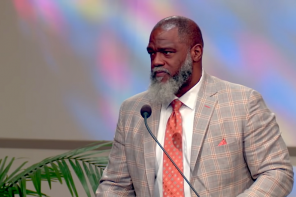In an essay for the St. Louis Beacon on Friday, former Senator John C. Danforth criticized what he calls “unfair commentary” on the religious beliefs of candidates, when those beliefs have “no connection to any position on a political issue.” As an example he revives this summer’s discussion about Michele Bachmann’s views on women’s submission after she gave a vague answer to a direct question on the subject in one of the earliest presidential debates.
Citing a Washington Post essay by religion scholar R. Marie Griffith which asserted that “women like Michele Bachmann are now thoroughly accepted as public authorities in extremely conservative Christian circles,” he concludes that “Bachmann’s citation of Paul does not imply a subservient role for women in American life.”
Danforth seems to suggest that conservative Christians now understand submission theology as the requirement that both men and women submit to God, and that it is therefore not related to Bachmann’s politics, just to, he writes, “femininity.”
But the fact that some conservative Christians embrace what is often called “mutual submission,” in no way demonstrates that other conservative Christians don’t still promote a patriarchal theology in which women’s roles are still limited to “helpmeet;” a patriarchal theology which many have experienced as destructive and abusive.
As I wrote here on RD after that debate:
In the conservative Christian world there is a spectrum of views on how these texts (the biblical texts concerning women) are to be read. Evangelical feminists argue that the Bible actually teaches mutual submission between men and women.
Sarah Posner argued that Bachmann’s lack of clarity on this issue, and the potential impact it would have on policy, make it fair game for public inquiry:
Bachmann has reached out to evangelical voters by emphasizing her adherence to a “biblical worldview,” but when questioned about it — particularly about the “biblical” view of gender roles — Bachmann wasn’t a very good evangelist… [and her] policy initiatives, as they relate to issues like gay marriage, abortion and funding for Planned Parenthood, stem directly from her “biblical” view of gender roles.
And there remain conservative Christians who do believe that any role in which women are in authority over men violates their essential feminine nature given to them by God, such as the “Complementarians” at the Council on Biblical Manhood and Womanhood, which was founded to counter mutual submission theology. Others, like the Reconstructionists, as I noted in the earlier post, “have suggested that, given the biblical order for families, women probably shouldn’t be voting.”
Were Senator Danforth to talk with the folks over at No Longer Quivering who work to help women leave the Quiverfull Movement, he would find that in this community submission means absolute submission to your husband and a life of producing as many children as is physically possible to “fill his quiver.” Or he might check with the survivors of Bill Gothard’s submission theology, which Sarah Posner wrote about here, or some of the women I wrote about in my book.
This isn’t to assume that Bachmann’s views on submission do necessarily line up with the Complementarians, the Reconstructionists, Gothard, or the Quiverfull Movement. Senator Danforth rightly argues against guilt by association, although “innocence without question” is hardly better for the health of our democracy. When a candidate foregrounds her religion as Bachmann does, and when she may well support a theology that challenges women’s equality, and produces family situations that many have come to see as destructive and abusive, asking her how she understands that theology and how it would impact her leadership should she win election, certainly is fair game.




